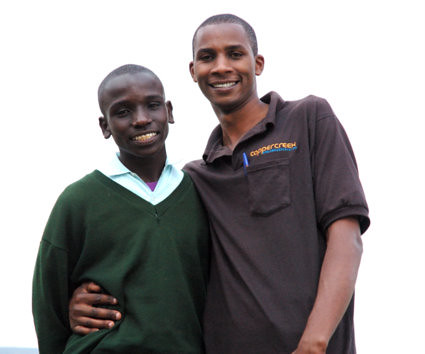“A good mentor can change a youth’s direction in his/her life.” Said Ezekiel, 25 year-old, a 4th-year-student studying bachelor of commerce in Egerton University, also a mentor within Ripe For Harvest Nakuru Mentorship Program.
After joining the RFH Nakuru Mentorship Program in his university, Ezekiel, through Flamingo Primary School teachers’ help, found his two mentees– Richard, 14 year old, an orphanage child whose primary school fee is sponsored by a church, and Joshua, also 14 year old, the same grade (8) as Richard, a child of a single mother.

"I would not leave my mentees after I graduate from university. Mentorship is a relation lasting for many years." Said Ezekiel.
When asked about the reason why he chose these two mentees, Ezekiel said, “It is important to have some one to advise teenagers about what kind of persons they want to become in future. As their (my mentees’) parents were not able to do this, I hope I can help.”
It is not easy for the kids who have family trauma to give their trust to a stranger. “In the beginning, it was hard for my mentees to open up. So I played soccer and music with them. We also ate and danced together. Our mentorship program also held group discussions and games for all mentors and meentees and I found sometimes it is easier for children to open up in a group. I kept visiting them about two hours per week since September last year. After I feel the basic trust between us was built up gradually, I tried to add more conversations during our activities.”
About the content of the conversations between him and his mentees, Ezekiel said he usually talked about the importance of academics. “For myself, I learned the lesson that education is the most accessible way to make people’s life different especially if they come from a poor family. Therefore I encouraged my mentees to work hard and I sometimes tutor their studies.” His two mentess, after sharing his own experience, decided by themselves to repeat the last year in their primary school in order to gain a better academic performance for getting in secondary school.
Besides school, Ezkiel also communicated with his mentees about their social life. He listened to them about their relationship with schoolmates and advised them how to treat their peers, especially their female peers. “Richard is a good boy but sometimes he behaved beyond his wish. I therefore paid attention to assist him to control his emotion.”
“The most important thing for these two mentees, as I think, is to guide them to look at their lives in a positive aspect.” He continued, “I told them that recently I could not help them on their financial problem but I want them to be confident about their abilities to live their lives.”
He described his two-year experience of doing business in Nairobi before going to the university. “I shared this part of my experiences with my mentees that to do business, basic education is needed. However, if they unfortunately are not able to have college education, do not feel there is no hope. They can start their own business, as in this field, creativity and communication skills are more essential—it is proved by a lot of celebrate businessmen who did not get through higher education.” Said Ezekiel.

Ezikiel and His Mentee Joshua
When he was asked about what benefit he obtained through this mentorship relationship, he said sincerely, “I learned a lot.”
“I reviewed myself when I was sharing my experiences with my mentees. I understand more about what I had been missed during my teenage and I hope I can catch up with improving myself.”
“Also, I hope through sharing my experiences, my mentees will not miss the same thing and make the same mistakes as I did. It will be the happiest moment for me to see their good changes.”
“More importantly, they let me realize that I want to empower myself so I can help them and others more in future. I want to start my own business after graduation in this December, so I will have financial ability to help them on their education or support them with job positions in the coming future.”
The question about what he plans to do about his mentorship relations with his mentees after graduation therefore was not needed. “Mentorship is a thing may last for ever and I hope this mentorship circulation could be continued by my mentees’ mentoring others.”
Ezekiel just confirmed my thought. To be honest, I was also mentored by him through this short conversation.

Ripe For Harvest Mentorship Program
Posted By Luna Liu
Posted Aug 2nd, 2009


1 Comment
Melysa
August 2, 2009
I really enjoyed your post. The conversational tone is excellent, and I felt like I learned a lot about the personal nature of mentoring, and the influence it can have. I am impressed with how open and down to earth the young people you interviewed are. Such a refreshing attitude.